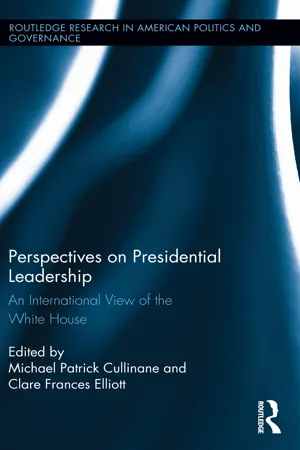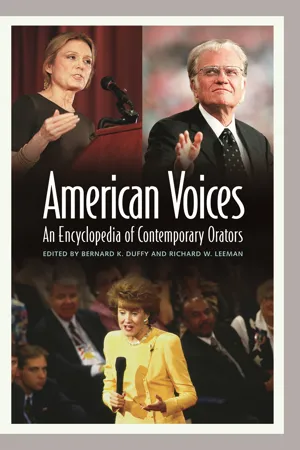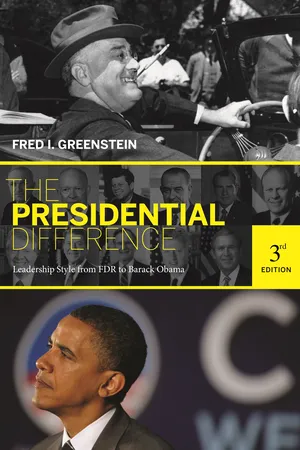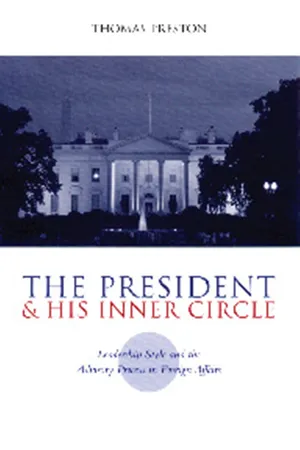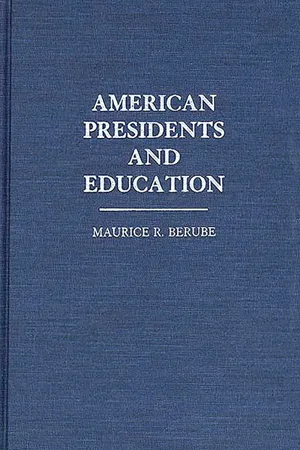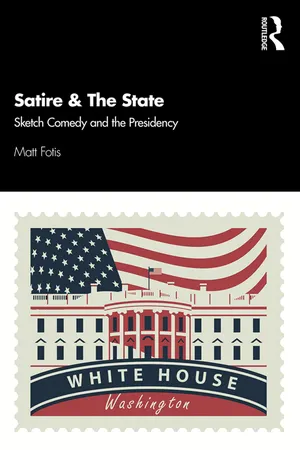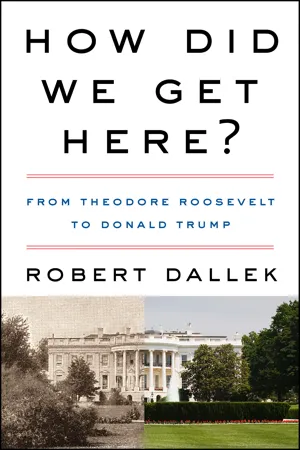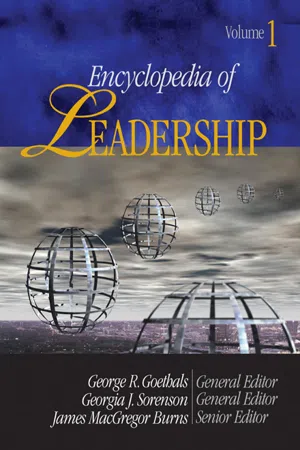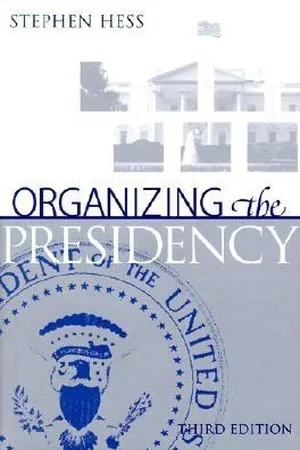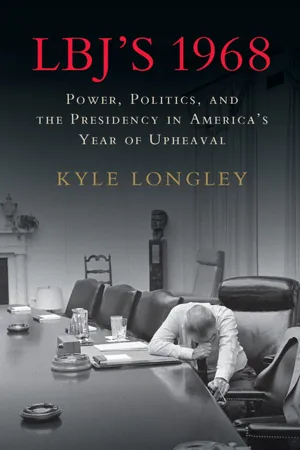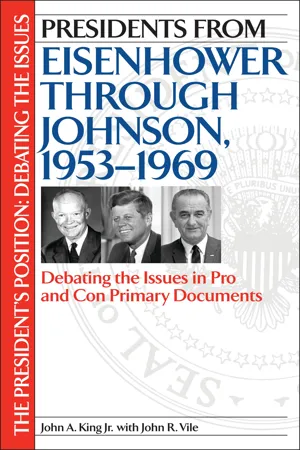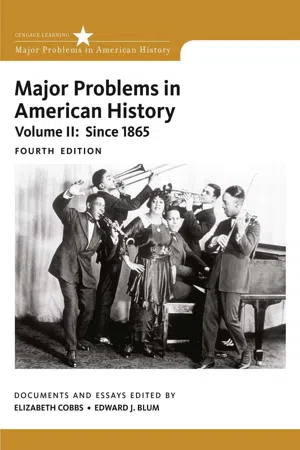History
Lyndon B Johnson
Lyndon B. Johnson, often referred to as LBJ, was the 36th President of the United States, serving from 1963 to 1969. He is best known for his "Great Society" programs, which aimed to eliminate poverty and racial injustice. Johnson also signed the Civil Rights Act of 1964 and the Voting Rights Act of 1965, making significant strides in the civil rights movement.
Written by Perlego with AI-assistance
Related key terms
1 of 5
12 Key excerpts on "Lyndon B Johnson"
- eBook - ePub
Perspectives on Presidential Leadership
An International View of the White House
- Michael Patrick Cullinane, Clare Frances Elliott(Authors)
- 2014(Publication Date)
- Routledge(Publisher)
9 LBJ If Not for VietnamSylvia EllisLyndon Johnson rarely ranks in the top ten of American presidents. Yet his domestic record was in many ways unparalleled. He was labeled “Lincoln’s successor” on civil rights due to his executive leadership on the issue, oversaw a strong economy for most of his term, and introduced landmark Great Society legislation designed to tackle a range of health, environmental, poverty, education, and housing issues. Despite these achievements, many of which still shape the American social and political landscape, he does not feature in the pantheon of American presidential heroes and is rarely cited as a great leader. This is despite the fact that in recent years, LBJ has, to a large degree, been rehabilitated by academics in the growing literature on his presidency.1 While some earlier works emphasized Johnson’s mismanagement of U.S. foreign policy, dwelled on his power-hungry nature, and/or questioned his administration’s management of its avalanche of programs, recent studies have been more generous in their appraisal of his record and his leadership skills. This shift in scholarly judgment of LBJ’s leadership qualities is reflected in a recent rise in his position in presidential rankings by historians, achieving third place in a Newsweek survey of leading American historians in 2012 and 11 th in a survey of British scholars the previous year.2 His stock remains low with the American public, however. The Newsweek survey also canvassed the American public, and LBJ did not feature in their top ten. This continues a long trend. In a 1988 Louis Harris poll, Johnson was placed at or near the bottom in 11 categories on modern American presidents. In 1999, a C-SPAN poll of viewers placed Johnson 19 th, and, over a decade later, in February 2011, he occupied the same position in a Gallup poll.3 Part of the explanation for this lack of appreciation of LBJ’s leadership qualities is, of course, related to his handling of the Vietnam War. Indeed, “If Not for Vietnam” is the title of this article because most analysts explain Lyndon Johnson’s poor showing by adding a similar rider to their own judgments on the 36 th president, and that included his contemporaries and political aides. In 1972, former U.S. Ambassador Averell Harriman told LBJ’s biographer, Doris Kearns Goodwin: “ ‘If it hadn’t been for Vietnam’ then Lyndon Johnson would ‘have been the greatest President ever.’ ”4 Two decades later, Richard Goodwin, a speechwriter for the Johnson administration, acknowledged that the “ghost of Vietnam” haunted the Johnson presidency: “for years afterward, the moans of the battlefield . . . obscured the narrative of achievement and spacious vision that may ultimately rank Lyndon Johnson among our very great leaders.”5 This article explores the strengths and weaknesses of LBJ’s presidential leadership. Though Vietnam may be the main reason why the public and even many scholars consistently downplay Johnson’s qualities, it is not the only one. His record is also tarnished by questions surrounding his political methods, style, and character. And, at present, a contemporary disdain for American liberalism means that he is in danger of becoming, as one commentator put it, “the invisible president.”6 - eBook - PDF
American Voices
An Encyclopedia of Contemporary Orators
- Bernard K. Duffy, Richard Leeman, Bernard K. Duffy, Richard Leeman(Authors)
- 2005(Publication Date)
- Greenwood(Publisher)
Lyndon Baines Johnson (1908-1973) 203 "Political Votes, Economic Oats." Washington, D.C, January 20, 1978. SFH, pp. 23-36. "A Pursuit of Peace: A More Excellent Way" (com- mencement speech at the University of Rhode Is- land). Kingston, R.I., May 27, 1979. SFH, pp. 215- 23. "Service and a New World Order" (speech to the First Annual Conference on Human Values). London, April 1, 1981. SFH, pp. 76-86. "Liberation and Justice: A Call for Redefinition, Re- focus, and Rededication" (speech to the tenth an- nual convention of Operation PUSH). Chicago, July 9, 1981. SFH, pp. 48-63. "Dreaming New Dreams." Washington, D.C, August 27, 1983. SFH, pp. 19-22. "The Call of Conscience: Redemption, Expansion, Healing, and Unity" (speech to the Democratic Na- tional Convention). San Francisco, July 17, 1984. Vital Speeches of the Day, November 15, 1984, pp. 77-81. "Save the Family Farm and the Farm Family" (speech to the Saturday Morning Community Forum of Operation PUSH). Chicago, January 26, 1985. SFH, pp. 282-88. "Common Ground and Common Sense" (address to the Democratic National Convention). Atlanta, DAVID ZAREFSKY History has not been kind to Lyndon Baines John- son. The achievements of his Great Society have fallen victim to the widespread belief during the 1980s and 1990s that "big government" does not work. After the Cold War ended, Vietnam was in- creasingly regarded as a tragic error prompted by blind adherence to ideology rather than to practi- cal realities. As the issues in civil rights have be- come more complex and intractable, the massive achievements of the 1960s look in retrospect like a promise unfulfilled. The Johnson presidency does not appear to have presented occasions that would call forth decisive rhetorical moments. Even Democratic partisans frequently omit John- Ga., July 20, 1988. Vital Speeches of the Day, Au- gust 15, 1988, pp. 649-53. "Empower Your Dreams" (address to Black Collegian magazine's twentieth anniversary celebration). - eBook - ePub
The Presidential Difference
Leadership Style from FDR to Barack Obama - Third Edition
- Fred I. Greenstein(Author)
- 2012(Publication Date)
- Princeton University Press(Publisher)
Lyndon Johnson ranks with Henry Clay as one of the most gifted practitioners of the art of the possible in American history. Here he is seen in a nose-to-nose exercise in political persuasion with Rhode Island senator Theodore F. Green. Johnson’s political prowess was not coupled to a disposition to assess the feasibility of his policies. In 1965, he led the United States into a military intervention in Vietnam without exploring its costs and probable consequences. By 1968, there were a half-million American troops in Vietnam, and the Johnson presidency was on the ropes.(George Tames/NYT Pictures, The New York Times Company)CHAPTER 6
Lyndon B. Johnson and the Primacy of Politics
All I have I would have given gladly not to be standing here today. The greatest leader of our time has been struck down by the foulest deed of our time. Today John Fitzgerald Kennedy lives on in the immortal words and works that he left behind.– LYNDON B. JOHNSON, ADDRESS BEFORE A JOINT SESSION OF CONGRESS ,NOVEMBER 27, 1963Let this session of Congress be known as the session which did more for civil rights than the last hundred sessions combined; as the session which declared an all-out war on human poverty; as the session which finally recognized the health needs of all our older citizens; as the session which helped to build more homes, more schools, more libraries, and more hospitals than any single session of Congress in the history of our Republic.– LYNDON B. JOHNSON ,STATE OF THE UNION ADDRESS ,JANUARY 8, 1964I have today ordered to Vietnam the Airmobile Division and certain other forces which will raise our fighting strength from 75,000 to 125,000 men almost immediately. Additional forces will be needed later and they will be sent as requested.– LYNDON B. JOHNSON, - eBook - ePub
The President and His Inner Circle
Leadership Style and the Advisory Process in Foreign Policy Making
- Thomas Preston(Author)
- 2001(Publication Date)
- Columbia University Press(Publisher)
5. Lyndon Johnson and the Partial Bombing Halt in Vietnam, 1967–1968“FROM ANOTHER VANTAGE POINT ”The Magistrate-MaverickHarry McPherson, who was Special Counsel to the President, fondly recalls that: “President Johnson was a hell of a leader! He was a hell of a man! He was a bull in a field full of heifers!”1 And this imagery—of a dominant, commanding figure striding through his advisory fields—is particularly apt when describing Lyndon Johnson in the White House. He was an exceptionally gifted politician with a knack for negotiating the treacherous shoals of domestic politics. He possessed an incredibly powerful and effective interpersonal style, as those who experienced “the treatment” firsthand would later attest. Even those who had worked for many different presidents, upon reflection usually smile and shake their heads incredulously at the mere mention of Lyndon Johnson’s name.Almost without exception he is remembered by former advisers as a “unique,” “out-of-the-ordinary,” “unconventional,” “mysterious,” or the most “difficult to understand or explain” man they had ever known.2 He was a man who cared deeply about domestic policy, who possessed both the political skill and policy expertise to shepherd his Great Society programs, War on Poverty, Medicare, and the expansion of civil rights through a sometimes reluctant Congress.3 And yet, however unjustly, Johnson will always be remembered for his foreign policies, especially on Vietnam.Here, Johnson’s touch was less sure. He possessed none of the policy expertise which he called upon so effectively in domestic politics. In foreign affairs, he was heavily dependent upon his staff of foreign policy experts, most of whom he had inherited from his predecessor John Kennedy. While still supremely self-confident and willing to take on the big problems if he believed it was the right thing to do, Johnson was least prepared as president to handle a foreign policy crisis of the magnitude of Vietnam. The great tragedy of Lyndon Johnson is that by choosing a policy path blazed by his predecessors, recommended by his advisers, and dictated by the cold war logic of Containment, he soon found himself neck-deep in the quagmire of Vietnam and politically trapped in a continually escalating spiral of involvement in a war he did not want.4 - eBook - PDF
- Maurice R. Berube(Author)
- 1991(Publication Date)
- Praeger(Publisher)
King was hesitant to support him for president in 1964 until he could discern "how he acts in a crisis, like Kennedy." 19 Although they acted in tandem on civil 64 American Presidents and Education rights, King distanced himself from Johnson over the Vietnam War, which he considered immoral. 20 Johnson's support of civil rights came early as president. Five short days after the assassination of Kennedy, Johnson declared to Congress that for civil rights "it is time now... to write it in the book of law." 21 Kearns wrote that in rising to the occasion, Johnson "had become a moral leader." 22 This declaration cost him votes. In the 1964 presidential election, he lost his white constituency in the Deep South, although he obtained 90 percent of the black vote. Aware of this eroding constituency, he pushed for civil rights and his Great Society with all deliberate speed. By 1965, Johnson delivered his boldest proposal for alleviating the con- dition of blacks in America. In a commencement speech to the students at Howard University in Washington, D.C., Johnson moved beyond accom- modation and voting to economic rights. He proclaimed that for blacks "just legal equity" was not enough. 23 What was required was "equality as a fact and equality as a result." 24 This meant decent jobs, housing, health care and incentives to repair the disintegrating black family. Most important was "a chance to learn—an equal chance to learn." 25 These goals were to be achieved through government programs. He ended his speech with a pledge: "And to all these fronts—and a dozen more—I will dedicate the expanding efforts of the Johnson administration." 26 It was an ambitious program, sincerely promised; however, Johnson was not to make good on his pledge. His growing obsession with a developing Vietnam War funneled both his attention and needed monies away from his Great Society for black America. - eBook - PDF
Satire & The State
Sketch Comedy and the Presidency
- Matt Fotis(Author)
- 2020(Publication Date)
- Routledge(Publisher)
101 Lyndon Baines Johnson and Richard Nixon had two of the most tumultuous pres- idencies in U.S. history. Coming on the heels of the JFK assassination, amid the civil rights movement, and consumed by the Vietnam War, Johnson and Nixon oversaw a deeply divided nation that was beginning to lose trust in its govern- ment – mostly because of Johnson and Nixon. Satire, as well, was in a strange place in 1964. When JFK was in office, our Cold War enemies were apparent and the satiric targets were obvious, but suddenly nothing was clear. The whirlwind after JFK’s assassination just created more confusion. The Second City’s Sheldon Pat- inkin summed up the country’s comedic mood when he said, “people wanted to laugh, but I don’t think anyone knew what to laugh at, or if they could.” 1 As LBJ took the oath of office, America was entering an unprecedented period of change and social upheaval. LBJ was an outsider in the Kennedy White House and relatively unknown to the nation when he assumed the presidency. His time in office was an enigma, at times loved and hated by virtually everyone on both sides of the aisle; he was the perfect metaphor for a country in the middle of an uncertain time. His personal behavior was crude, rude, and obnoxious, yet he was one of the most skilled politicians to ever hold the office. He was the architect of the Great Society and much of the contemporary social safety net, like Social Secu- rity and Medicare. Yet he is also inextricably tied to the escalation of the war in Vietnam. He forged ahead and passed the 1964 Civil Rights Act and 1965 Voting Rights Act when no one thought it possible, but the most lasting image of him is protesters chanting, “Hey, Hey, LBJ, how many kids did you kill today?” He was liberal to some and conservative to others – seemingly able to let down anyone and everyone. LBJ’s paradoxes funneled into satire, where most of the humor focused on Vietnam and the Johnson administration rather than on the president himself. - eBook - ePub
How Did We Get Here?
From Theodore Roosevelt to Donald Trump
- Robert Dallek(Author)
- 2020(Publication Date)
- Harper(Publisher)
Chapter 7 Lyndon B. Johnson Flawed GiantAs with other vice presidents who unexpectedly assumed office like Theodore Roosevelt, Calvin Coolidge, and Harry Truman, Lyndon Johnson understood that his initial task was to convince Americans that he was ready to fulfill his predecessor’s agenda. In his speech before a joint session of Congress five days after Kennedy’s death, Johnson recounted Kennedy’s goals and quoted his request to the country, “Let us begin.” Johnson now declared, “Let us continue,” urging Congress to pass Kennedy’s stalled agenda—cutting taxes; approving Medicare, federal aid to education, and a civil rights law ending racial segregation in all places of public accommodation.Johnson like Kennedy came to the presidency with a world of political experience. His father had served in the Texas lower house and in 1931 had arranged for Lyndon, who was teaching speech in Houston’s Sam Houston High School, to become a congressional secretary to Texas congressman Richard Kleberg—a playboy from the Rio Grande Valley. Kleberg was a member of the wealthy King Ranch family that owned a huge spread in the Valley. He was also a self-indulgent patrician with little interest in government or working with the Roosevelt White House to end the Depression. He largely left the business of his office to Johnson, an avid supporter of FDR’s New Deal.In 1935, Johnson convinced House Speaker Sam Rayburn, a fellow Texan, to have FDR name him director of the Texas division of the National Youth Administration (NYA), an agency the White House had created to help young people develop job skills that could keep them off the unemployment rolls. Johnson quickly established himself as the best state director in the nation, so much so that Eleanor Roosevelt visited him in Austin to observe his methods. What made him special was his boldness in spending an occasional night at a black college, which, had it been known at the time in strict segregationist Texas, would have undermined his chances of ever running for public office. Johnson had a special regard for underdogs who wished to improve themselves; it was an extension of his own experience. Young black men who asked if they could become an engineer or an airline pilot especially touched Johnson’s sense of injustice about the roadblock to a better life for people of color. - eBook - PDF
- George R. Goethals, Georgia J. Sorenson, James MacGregor Burns, George R. Goethals, Georgia J. Sorenson, James MacGregor Burns(Authors)
- 2004(Publication Date)
- SAGE Publications, Inc(Publisher)
people about the real costs and dangers of the nation’s involvement in southeast Asia. When the war went badly, his deceptions and poor judgment opened up a credibility gap with the people whom he had been elected to lead. Lyndon Johnson’s tragic career is an object lesson in how not to conduct the affairs of a democracy to achieve effective leadership. —Lewis L. Gould Further Reading Andrew, J., III. (1998). Lyndon Johnson and the Great Society. Chicago: Ivan Dee. Bernstein, I. (1996). Guns or butter: The presidency of Lyndon Johnson. New York: Oxford University Press. Beschloss, M. (1997). Taking charge: The Johnson White House tapes, 1963–1964. New York: Simon & Schuster. Beschloss, M. (2001). Reaching for glory: Lyndon Johnson’s secret White House tapes, 1964–1965. New York: Simon & Schuster. Califano, J. A. (1991). The triumph & tragedy of Lyndon John-son. New York: Simon & Schuster. Caro, R. (1982–2002). The year of Lyndon Johnson (3 vols.). New York: Random House. Conkin, P. (1986). Big daddy from the Pedernales. Boston: Twayne. Dallek, R. (1991). Lone star rising: Lyndon Johnson and his times, 1908–1960. New York: Oxford University Press. Dallek, R. (1998). Flawed giant: Lyndon Johnson and his times, 1961–1973. New York: Oxford University Press. Divine, R. A. (1994). Exploring the Johnson years: Vol. 3. LBJ at home and abroad. Lawrence: University Press of Kansas. Gould, L. L. (1999). Lady Bird Johnson: Our environmental first lady. Lawrence: University Press of Kansas. Lerner, M. B. (2002). The Pueblo incident: A spy ship and the failure of American foreign policy. Lawrence: University Press of Kansas. Unger, I., & Unger, D. - eBook - PDF
- Stephen Hess, James P. Pfiffner(Authors)
- 2002(Publication Date)
- Brookings Institution Press(Publisher)
CHAPTER Lyndon B.Johnson i9 6 3-*9 6 9 On November 27,1963, Lyndon Baines Johnson, president for five days, declared before a joint ses-sion of Congress that the theme of his adminis-tration would be continuity. John F. Kennedy had been assassinated. The nation was in mourning. All appointees of the slain leader were being asked to continue to serve the new president. Unlike Truman, who moved quickly to put in his own people, Johnson made no changes in the cabinet for thir-teen months. And at the White House he combined his staff with Ken-nedy's staff, producing what an assistant called Noah's ark: There's two of everybody. 1 Much later Johnson regretted retaining Kennedy's appointees, but at the time he felt that he had no choice. 2 The nation's paramount need was for stability and reassurance. When Johnson became president, some friction with his inherited staff was inevitable. Kennedy himself had treated his vice president with civility and respect—Johnson had, after all, helped carry enough southern states to enable Kennedy to win in 1960 and had then relinquished the substantial powers of Senate majority leader for the isolation and the superficial responsibilities of a constitutional appendix. But many of Kennedy's aides looked upon Johnson, when they thought of him at all, as some obscure blood relation whose table manners left room for improvement. He was a southerner in a Northeastern regime; nouveau riche, uncultured, and middle-aged in a patriciate that celebrated youth; a Protestant fundamen-78 7 Lyndon B. Johnson 79 talist in the government of the first Catholic president. He was, for them, a usurper, and an ignoble one at that, as Eric Goldman observed. And so the Kennedy holdovers snickered and sniped, half performed their tasks, and engaged in petty sabotage. 3 But those willing to transfer their loyalty to the new president were to have their effectiveness enhanced. - eBook - PDF
LBJ's 1968
Power, Politics, and the Presidency in America's Year of Upheaval
- Kyle Longley(Author)
- 2018(Publication Date)
- Cambridge University Press(Publisher)
6 He fought a losing battle in 1967 on his anticrime bill that called for strong gun control measures and restrictions on electronic eavesdrop- ping. Now, he wanted victories and added anti-riot programs to attract conservatives. 7 The laundry list of proposals paled in comparison to those from the early Johnson presidency. LBJ and his staff were nearly five years into their tenure, and they had won many victories on civil rights and health care. At this point, they fought to sustain momentum in the face of increasing conservative opposition. The Vietnam War also drained a significant amount of energy as well as resources. In 1968, the country appeared more interested in stopping rioting and crime than expanding A NATION ON THE BRINK 11 the Great Society and its focus on reducing poverty and racism. Thus, an increasingly tired LBJ and his aides struggled to find traction for bold initiatives, something that frustrated the president. Finally, in late December 1967 at the ranch, Califano presented a series of large charts with dots placed on them. A red dot indicated administrative action needed, while a blue one required legislation. Finally, at the top was a short quotation for the speech giving the philo- sophy or broad goal. Much haggling followed, with the president making the final determination on priorities and language. Califano returned to Washington to talk with different people, going back and forth four times to hammer out details. Then, Califano developed one-page summaries, with Johnson decid- ing whether to include or not. The chief domestic advisor described the process as “essentially like an accordion . - eBook - PDF
Presidents from Eisenhower through Johnson, 1953-1969
Debating the Issues in Pro and Con Primary Documents
- John King, John R. Vile(Authors)
- 2005(Publication Date)
- Greenwood(Publisher)
The most dramatic moment of Johnson's speech however, came when he announced that he would not run for reelection. Johnson told the American people that he did not want electoral politics to compromise his position in negotiating an end to war. Johnson was tired, beleaguered, and maligned by a public that no longer trusted him or his administration. Americans had indicated their displea- sure with Johnson in the New Jersey Democratic primary on March 13, in which dovish Senator Eugene McCarthy won 42 percent of the vote to Johnson's 48 percent. This inspired Robert Kennedy, one of Johnson's greatest rivals within the Democratic Party, to declare his own candidacy three days later. Johnson had tried, and failed, to contain communism in Vietnam. His obsession with the war combined with his self-described "love affair" with the "Great Society" proved incompatible; he could not devote the resources of America to both and produce both "guns" and "butter." His "middle way" had failed. Tragically, when he left office, Johnson and the LYNDON BAINES JOHNSON 223 American people were frustrated. There had been no 'Tight at the end of the tunnel" in Vietnam, and at home the "Great Society" remained elusive. PRESIDENT LYNDON B. JOHNSON, "PEACE WITHOUT CONQUEST," JOHNS HOPKINS UNIVERSITY (APRIL 7, 1965) Tonight Americans and Asians are dying for a world where each people may choose its own path to change. This is the principle for which our ancestors fought in the valleys of Pennsylvania. It is the principle for which our sons fight tonight in the jungles of Viet-Nam. Viet-Nam is far away from this quiet campus. We have no territory there, nor do we seek any. The war is dirty and brutal and difficult. And some 400 young men, born into an America that is bursting with opportunity and promise, have ended their lives on Viet-Nam's steaming soil. - Elizabeth Cobbs, Edward Blum, Jon Gjerde, , Elizabeth Cobbs, Edward Blum, Jon Gjerde(Authors)
- 2016(Publication Date)
- Cengage Learning EMEA(Publisher)
This was the path chosen by U.S. courts in the late 1960s, a legal version of the informalization going on in American society at large. And for the time being, at least, it has remained the law of the land. 398 MAJOR PROBLEMS IN AMERICAN HISTORY Copyright 2017 Cengage Learning. All Rights Reserved. May not be copied, scanned, or duplicated, in whole or in part. Due to electronic rights, some third party content may be suppressed from the eBook and/or eChapter(s). Editorial review has deemed that any suppressed content does not materially affect the overall learning experience. Cengage Learning reserves the right to remove additional content at any time if subsequent rights restrictions require it. Vietnam: Flawed Decisions, Terrible Consequences FREDERIK LOGEVALL For a man who led his country into what is widely seen as a disastrous war, Lyndon Baines Johnson has enjoyed surprisingly gentle treatment from histor-ians. He has had his detractors over the years, to be sure, but most authors have been at once critical of his Vietnam policy and sympathetic to his plight. Johnson made the wrong decision in 1965, they in essence argue, but how can you blame him? After all, with the exception of poor old George Ball, the un-dersecretary of state, all of the president ’ s senior advisors advocated a military solution in the key months of decision, while in the broader foreign policy bu-reaucracy, the pressure was all in the direction of escalation. On Capitol Hill and in elite public opinion generally, so it is implied, the mood in the same period was likewise hawkish, or at least unquestioning. An all-powerful “ Cold War consensus ”— never much analyzed in this literature — reigned supreme in American opinion and dictated that the commitment to South Vietnam had to be maintained, through major military escalation if necessary. In real political terms, therefore, so the argument goes, LBJ had no choice but to expand the war.
Index pages curate the most relevant extracts from our library of academic textbooks. They’ve been created using an in-house natural language model (NLM), each adding context and meaning to key research topics.
